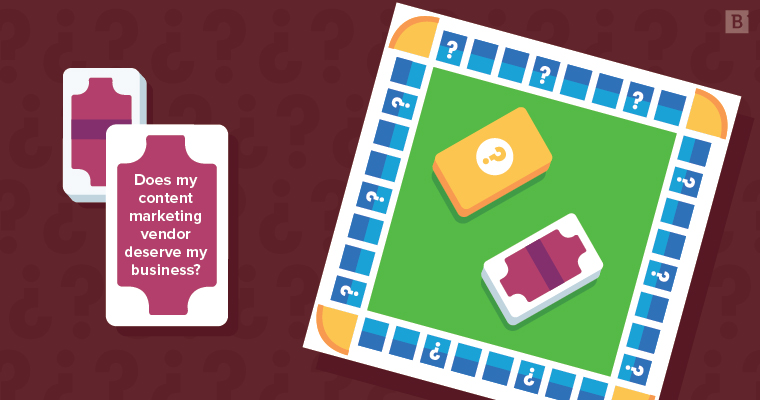There’s no such thing as a stupid question, per se. But some are better than others at getting to the heart of an issue. This is true for most things in content marketing, but especially for when you’re asking the biggest question of all: Can this agency bring value to my organization?
Granted, you’re not playing a game of 21 questions. There is no timer or limit on the number of allowable queries. Still, you are essentially taking an educated guess at the end of the process, and if you get the answer wrong, it will cost you.
So to help out, we’ve created a sort of cheat sheet. It’s a bit like 21 questions, but there’s only 10 of them, and after you ask them, you hopefully won’t have to guess if your content marketing vendor deserves your business.
Let’s begin:
1. Do you replace my SEO company?
Ideal answer: “We certainly can if you need us to.”
SEO is exactly what it sounds like – a concerted effort to improve your web presence on search engines. Content marketing facilitates SEO because search engines crawl content to generate results. In other words, content marketing is an SEO activity, but not all SEO activities are necessarily content marketing. Case in point, re-writing on-page metadata is SEO, not content marketing. Still, search engine marketing (SEM) and other SEO tactics can help promote your content in order to generate leads. Basically, there’s a lot of overlap between the two, and often, it’s difficult to execute toward one without also considering the other.
So if your vendor tells you “they only do content,” run.

2. Are you able to help out with social media?
Ideal answer: “Absolutely!”
Social is invaluable for getting your content out to a precise target audience. Your prospects come to these channels to find content and information that will influence their decisions and improve their businesses. Case in point, 84 percent of C-level buyers use social media when making purchasing decisions. It’s as close as content ever gets to “shooting fish in a barrel.”
Why on earth would any content marketing vendor not offer social consulting?
3. What about website consulting?
Ideal answer: “That too! How else could we say in good conscience that we can get you more leads?”
Website design and UX have a significant impact on click-through rates, bounce rates and perhaps most importantly of all, conversions. Something as simple as a form with too many fields could cause you to miss out on a shiny new email address. A few broken links could hurt your SEO ranking. Even if you don’t plan to pay for website consulting, ask the question. You’ll get so much more intravenous wisdom from an agency that knows its way around some <div>’s.
4. What types of content do you create?
Ideal answer: “All of the content.”
We realize that some content marketers prefer to “specialize” in one area. But your prospects aren’t exactly “content consumption specialists.” They watch videos. They peruse social media. They read articles on LinkedIn Pulse. They scan email subjects, click on them, read the content, maybe download the infographic about vendor management best practices and perhaps go to your website to see what your landing pages have to say. The modern user is a proper content connoisseur. You need a master chef that has experience cooking up a diverse menu of content types.
The modern user is a proper content connoisseur. You need a master chef that has experience cooking up a diverse menu of content types.
5. Are you able to produce industry-specific content, and do you have samples?
Ideal answer: “You name an industry, we’ll provide a sample.”
B2B content marketing is filled with niche products that often require a depth of subject-matter understanding and some extraordinarily nuanced business messaging. While you shouldn’t necessarily expect someone in your content marketing agency’s sales team to know the difference between, say, a SIEM and a SOC in cybersecurity, they should be able to produce samples that prove they’re capable of writing with some depth about information security systems.
6. Will you provide a marketing strategy?
Ideal answer: “Yes. Or, we can work with you to augment your existing strategy.”
First, ask yourself, what do you hope to achieve with content marketing? Are you trying to build up a contact list for a drip campaign? Are you interested in an SEO power play? Are you trying to build greater brand awareness on the web? All of the above?
If so, present those goals to your vendor. Put them on the spot: Ask them what strategic steps they would take to accomplish those goals. Every content agency will tell you they can help with a marketing strategy. Make them tell you how they’ll help.
7. Do you work in email marketing as well?
Ideal answer: “Absolutely. We can strategize drips, build newsletters, create templates, write copy, help you capture new addresses and so on and so forth.”
Email generates the greatest ROI of any content marketing channel, so you (and your agency) would be remiss if you didn’t use it effectively. Ideally, your vendor should be able to help you contribute to a growing list of contacts (e.g., with gated content). They should also be able to map out an email drip campaign and generate well-formatted templates that work well on any screen (we can’t stress enough how important responsive design is in content marketing). And it goes without saying, but your agency should be able to craft copy that’s concise, clean, actionable, targeted and personalized.

8. What’s your standard operating procedure for content creation and delivery?
Ideal answer: [Insert very detailed response about devising a content strategy based on goals, researching keywords and topics to narrow those goals, creating topic ideas, executing on time and promoting upon posting].
Also, they should tell you that they can work flexibly. There should be some mention of SEO and keyword research. Competitive analysis. Content calendars. Topic ideation. Content mapping. Integration with your website. Streamlined delivery options. An easy editing and revision process. Project management resources for smooth collaboration. And so on and so forth. The little things matter, too. Ask how long the turnaround time is for standard delivery. Find out how quickly they can return revisions. (Read more about content marketing team structures here)
9. How flexible are your contracts?
Ideal answer: “Your money is your money. We won’t tell you how you can and can’t use it.”
Be wary of any content marketing agency that tells you it lacks the capacity to pivot its strategy and reallocate spend to a different content project, even if it’s executed in a different type of media (text to video, for instance). The inability to do so is a huge red flag that their workflows, but also their products, aren’t mature. Agility is everything in content marketing, and assuming that all product offerings have been properly valuated, it should be the rule and not the exception.
10. How will you demonstrate ROI?
Ideal answer: “Metrics, metrics, metrics.”
Don’t hesitate to ask the agency if they are Google Analytics-certified (not for a second, in fact). So much about content marketing ROI comes in the form of new opportunities for value, and it’s your agency’s job to show exactly where those opportunities are coming from. Conversion tracking in particular is extraordinarily useful (and it’s free, in case you want to give it a whirl). Granted, there’s a lot that goes into accurately tracking content marketing ROI (we recently published a blog post about it), and in general, the more you understand about how it works, the better you’ll be at detecting BS answers.

And with that we say: Go forth, young padawan. For you are ready.





